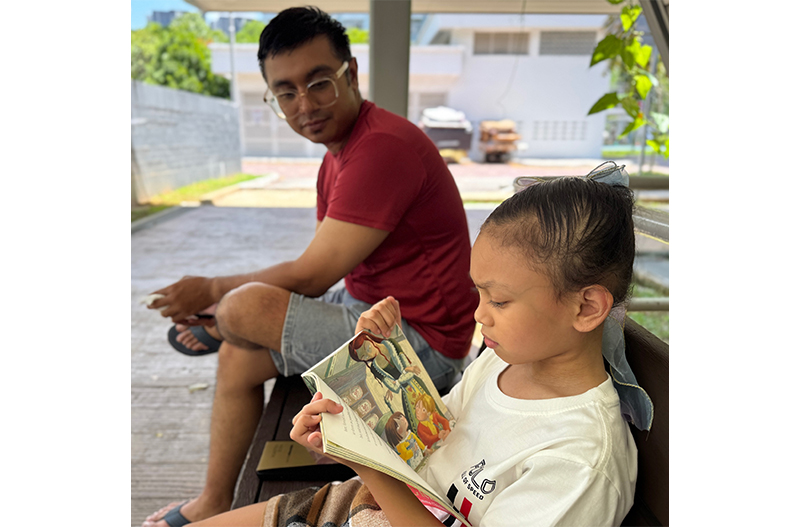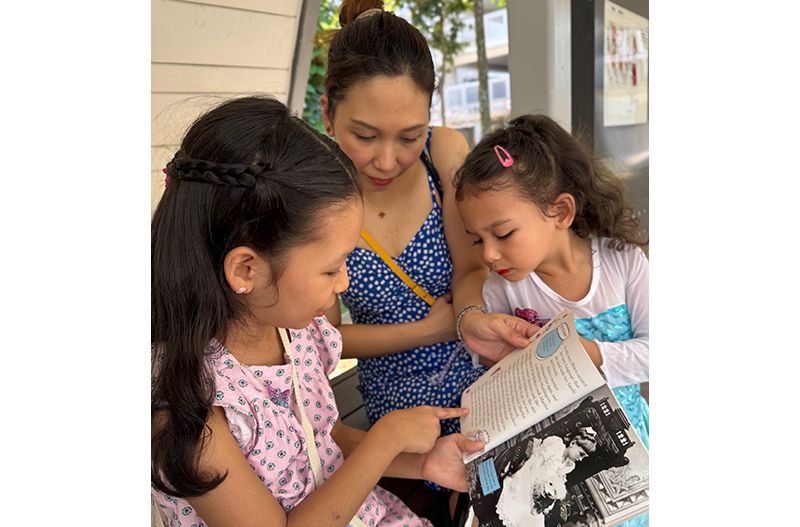Reading With Molly Today
NLB’s mobile library service provides children with access to books and library services.
By Loh Chin Ee and Koh Yu Qun
Molly, the mobile library service by the National Library Board (NLB), continues to serve the Singapore community today by bringing books to schools and neighbourhoods. The service operates in two forms: a Big Molly bus and two Mini Mollys.
The library service is supported by donations from the Kwan Im Thong Hood Cho Temple. Mini Mollys were introduced in 2014 to serve preschools under two schemes run by the Early Childhood Development Agency (ECDA) as well as children from lower-income households.1
Rolled out in 2016, the larger Big Molly serves disadvantaged communities such as individuals from orphanages, rental flats and welfare homes by bringing reading materials and library services to them. Big Molly visits neighbourhoods like Nee Soon,2 Punggol and Whampoa3 among many other heartlands and estates in Singapore on weekends,4 and special education schools and primary schools on weekdays.
Having access to a wide variety of books is a crucial factor to cultivate the joy of reading.5 Bringing Molly to neighbourhoods that include families living in rental flats is one way to ensure low-income families have access to books, narrowing the physical distance to public library resources.
Between October 2023 and June 2024, in a study supported by the NLB, a research team from the National Institute of Education (NIE), Nanyang Technological University (NTU) studied whether visits by children from families living in rental flats to Molly over the six-month period would see any improvements in their reading enjoyment, frequency of reading and language proficiency.
The NIE researchers first conducted a door-to-door reading survey with families with young children across two rental blocks in Punggol. Findings from the survey showed that parents believe that reading is important for their children. However, most families had fewer than 20 physical books at home and even less access to electronic books. While these families knew about the public library, about half of them did not visit the library at all, in part due to lack of time from work commitments, health issues or caring for multiple children. For those who visited, some were not inclined to borrow books as they were worried about book damage or incurring fines, preferring to read in the library instead.
In the second part of the study, the researchers shortlisted and invited several families with children between the ages of 4 and 9 to commit to visiting Molly two times a month over six months (“the intervention”). The children took the Singapore Multilingual Assessment of Receptive Vocabulary (SMARV) test to assess their vocabulary and a print recognition test to evaluate their familiarity with common titles read by children of their age, before and after the intervention.
A reading survey was also conducted with the children before the intervention and after the six months. The children were asked a number of questions about their reading enjoyment, their experience of attending storytelling sessions in Big Molly and their opinions on the Molly bus in general. Their parents were also interviewed, with questions centring around their experience of the Molly bus and any observed changes in their children’s attitudes and behaviours before and after the intervention.
The study had begun with eight families with a total of 11 children but five children dropped out. Four children were regular users, visiting Molly almost every two weeks, while the other two visited once a month. Time, conflicting schedules and lack of childcare arrangements for younger siblings were reasons that one family gave for dropping out.
Children who continued participating in the project benefited from their visits to Molly. Out of the six children, three saw an increase in their English vocabulary test scores post-intervention and four improved in their print recognition of common book titles read by children within their age group. However, the sample size is too small for these results to be conclusive.
More importantly, parents told us that their children now had access to more books, enjoyed reading more and read more frequently. During the six-month period, researchers observed that the children enjoyed the storytelling sessions on the bus, became more familiar with different book titles and borrowed books regularly.
An incidental but crucial discovery was that parents themselves appreciated the team’s support to visit Molly. Posters with the dates of Molly visits were given to families and pasted at lift lobbies. Reminders via WhatsApp were also sent to parents, helping them prioritise time for visiting Molly.
During Molly visits, researchers provided information about library loan periods and taught parents how to use the NLB app to extend loans using their mobile phones. Knowing about these procedures and learning how to use the technology helped parents feel at ease and more likely to borrow books for their children.
Nur Maya Edora, 7, is an avid reader both at home and in school. A library enthusiast, Maya often bugs her mother, Nur Hirma Sheeryn, to take her and her siblings to Punggol Regional Library, the library nearest to their residence. However, due to childcare reasons, travelling to the library as a family can be challenging for them.

Molly’s regular visits to their neighbourhood in Punggol allowed the family to visit and experience the library with convenience due to its proximity to their home. During the six months, Maya not only borrowed books for herself, but also picked out books for her younger sister. When asked how often she would like to visit Molly, Maya said: “I wish like every day.”
Nur Yarah is a bubbly 9-year-old and one of the most regular visitors to Molly. Jannah Belhida, her mother, found out about the bus through her friend and decided to take Yarah and her 3-year-old sister, Nur Farasha, to the bus to find out more. An advantage of regular visits to Molly was that it provided a Saturday routine for the family and gave Yarah access to new books. Yarah told us: “I now read before bed all the time. I will ask my mummy if there’s the library bus. I’m pretty disappointed if she says no.” After the intervention, Jannah decided to take the children to the nearby Punggol Regional Library as she preferred the huge selection of library books and the numerous activities for her children.

Originally an effort to bring library services to children living in rural districts, NLB’s mobile library service today continues its aims to of making library services more accessible to Singapore’s children. The study highlights that regular visits to Molly can empower low-income families by giving them more access to books, improving their children’s reading enjoyment and frequency, and directing them to public library services.
Working together with community partners to help these families become familiar with the Molly bus and establishing regular visits is one way to give our children a headstart in their reading journey.
 Loh Chin Ee is an Associate Professor with the English Language and Literature Academic Group, National Institute of Education, Nanyang Technological University. Her research focuses on literacy and literature education at the intersection of social class and globalisation.
Loh Chin Ee is an Associate Professor with the English Language and Literature Academic Group, National Institute of Education, Nanyang Technological University. Her research focuses on literacy and literature education at the intersection of social class and globalisation. Koh Yu Qun is a Research Assistant with the English Language and Literature Academic Group, National Institute of Education, Nanyang Technological University.
Koh Yu Qun is a Research Assistant with the English Language and Literature Academic Group, National Institute of Education, Nanyang Technological University.Notes
Whampoa Community Facebook, 22 January 2025, https://www.facebook.com/whampoacommunity.sg/photos/-attention-parents-exciting-news-for-families-who-love-books-molly-the-amazing-m/1037145995125388/?_rdr.
-
“About MOLLY Mobile Library,” National Library Board, last updated 20 February 2025, https://www.nlb.gov.sg/main/visit-us/public-libraries-singapore/mobile-library-molly. ↩
-
“Molly Mobile Library @ Nee Soon Link Is Here Till End of the Year! Check It Out!”, Youth-niverse - Nee Soon Link Youth Network Facebook, 16 May 2024, https://www.facebook.com/nsl.youthniverse/posts/molly-mobile-library-nee-soon-link-is-here-till-end-of-the-year-check-it-out/872616714903914/. ↩
-
“Catch Molly As She Visits Whampoa and McNair Estate on Sunday, 1.30 PM to 4.30 PM,” ↩
-
“Molly by NLB,” National Library Board Singapore Facebook, 21 October 2020, https://www.facebook.com/story.php?story_fbid=10157538455505924&id=15924095923. ↩
-
Sun Baoqi, Loh Chin Ee and Beth A. O’Brien, “Report on the Reading Habits of Bilingual Children in Singapore 2021,” National Institute of Education, 2021, https://repository.nie.edu.sg/entities/publication/803fa867-3b18-45eb-b1f6-af0c385b06e1/details. ↩

